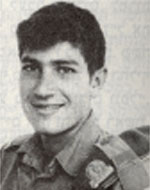Moshe, son of Esther and Chaim, was born on the 28th of Shvat, 5704 (February 1, 1954) in Tel Aviv, Until he was six years old, he lived with his parents in Jaffa and studied in a “cheder”. Few of the children who had been fortunate enough to study in the “cheder” and Moshe were one of them. When he was a five-year-old, he was well acquainted with many chapters of the Torah and was able to read and write. In the kindergarten he would sit surrounded by his friends and read to them from the book. When Moshe reached the age of elementary school, his parents moved to Holon, where he began his studies. When he was nine, his mother died, and the orphaned family moved to Kibbutz Galil-Yam. Every day for a whole year, Moshe went to the synagogue, which was about a kilometer from the kibbutz to say “Kaddish.” He did so without demand but on his own initiative and at his own will. When the family returned to Holon, Moshe graduated from elementary school and went on to study at the ORT vocational high school. His teacher from high school told him: “For four years I taught Moshe: In the class he was one of the leaders, whether in sports or social activities, he had a developed sense of justice and always served here for the underprivileged. Indeed, Moshe was the chairman of the student council at the ORT school, an outstanding basketball player – first to all his friends and loved by his teachers. When the time came for him to join the army, there were differences of opinion between him and his father. The father wanted him to go to the academic reserve, while Moshe insisted that he wanted to be a “real soldier.” Moshe was drafted into the IDF at the end of November 1972 and assigned to the Golani Brigade, where he took a commanding officer course. Moshe’s commander from the course says: “When we opened the course we knew from rumors: The leader of the good guys from Holon is here. Moses came and verified the rumor. Quiet, serious, with an enviable inner peace – won the admiration of the whole. Yoeli, the platoon commander, would say, ‘I give a platoon by hand to Moshe even tomorrow.’ “It was known that the commanders appreciate his opinion far above his formal status in the course, and I have already known several talented people, but I have never met such a happy guy, Whose every action shines success for you. ” On the 12th of Tishrei 5734 (October 8, 1973), Moshe fell in battle on Mount Hermon and was brought to eternal rest in the Kiryat Shaul cemetery. And left behind his father, and two sisters, and he was promoted to the rank of corporal Moshe Bitterman, who fought in a heroic battle, was among the recipients of the Medal of Honor. On Monday, it was OK to go up to Mount Hermon, and the order of the Golani Brigade commander was brief and unequivocal: a motorized force would go up to the outpost. The force that was moving on the half-tracks was also the late Corporal Moshe Bitterman, and suddenly, as he went up to the target, a powerful force of Syrian infantry fighters was well entrenched on either side of the road . While managing the fire with the Syrians, Moshe Bitterman, who was a Mag operator in the company’s company’s company, got up and began to fire long and precise rounds of fire at the Syrians. Even though he knew that his upper half was exposed to enemy bullets, the late Moshe Bitterman managed the battle with exemplary coolness, as if it were not a battle. He replaced ammunition and fired again. Until one time he got up, he was hit by Syrian fire and fell, “says Modi, who was with Moshe in the same half-track:.
